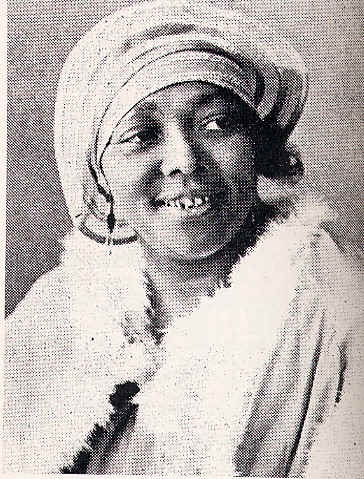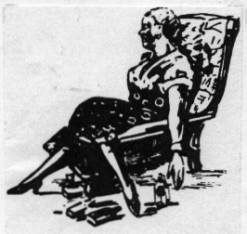
Painting © 2004 Loz
Arkle
Website
© Copyright 2000-2011 Alan White - All
Rights Reserved
Site optimised for Microsoft Internet Explorer



"Spotlight on
Lucille Bogan - Part 1"
by Max Haymes
 One
of the finest and toughest of all blues singers, Bogan (nee Anderson) was born
in Amory, Mississippi in Monroe County in 1897. Her family soon moved to
Birmingham, Alabama which was to remain her base until the late 1920s. At this
time she moved northwards to Chicago; returning to Birmingham in the 1930s.
Sheldon Harris (1) tells us she moved out to the West Coast in 1948 and died
there the same year, of coronary sclerosis. Survived by a son who might still be
living, this is just about all we know of this great blues singer. (2).
One
of the finest and toughest of all blues singers, Bogan (nee Anderson) was born
in Amory, Mississippi in Monroe County in 1897. Her family soon moved to
Birmingham, Alabama which was to remain her base until the late 1920s. At this
time she moved northwards to Chicago; returning to Birmingham in the 1930s.
Sheldon Harris (1) tells us she moved out to the West Coast in 1948 and died
there the same year, of coronary sclerosis. Survived by a son who might still be
living, this is just about all we know of this great blues singer. (2).
One
of the recurring subjects in Bogan’s blues was prostitution. The most famous
of these
being “Tricks Ain’t Walking No More”. Mistaken by U.S. black feminist
writer, Michele Russell in 1982, as a moral stand on the part of the singer,
who refuses to further degrade herself even though she’s ‘broke an’
hungry’; in fact “Tricks” is clearly a prostitute’s lament because of
a dwindling supply of customers or ‘tricks’. Poor blacks were hit by the
Great Depression long before it became ‘official’ as Bogan moans:
“Times
done got hard, money’s done got scarce,
Stealin’ an’ robbin’ is goin’ to take place.
Ref: ‘Cos tricks ain’t walkin’, tricks ain’t walkin’ no more.
I said tricks ain’t walkin’, tricks ain’t walkin’ no more.
An’ I’m goin’ to rob somebody if I don’t make me some dough.”
“I’m
goin’ to learn these walkin’ tricks what it’s all about,
I’m goin’ to get them in my house and ain’t gonna let them out.
Ref: ‘Cos tricks ain’t walkin’, tricks ain’t walkin’ no more.
I said tricks ain’t walkin’, tricks ain’t walkin’ no more.
An’ I can’t make no money, don’t care where I go.”
“I
got up this mornin’, with the risin’ sun,
Bin walkin’ all day an’ I ain’t caught a one.
Ref: ‘Cos tricks ain’t walkin’, tricks ain’t walkin’ no more;
I said tricks ain’t walkin’, tricks ain ‘t walkin’ no more.
An’ I can’t make a dime, don’t care where I go.” (3).
Bogan
recorded this song three times during 1930 and she obviously felt a strong
affinity with poor, black women driven by desperate social and economic
conditions to the “oldest trade in the world” only to find that the
Depression had hit that too. Things didn’t seem much better by 1935:
“I
credit one man, it was to my sorrow,
It’s cash today, credit tomorrow.” (4).
But
even in those hard times there was an alternative to being a street-walker in
the South; selling illicit booze or being a bootlegger. This was another
popular theme in Bogan’s repertoire, as titles such as “Sloppy Drunk
Blues” ,“Bootlegger’s Blues” and “Cravin’ Whiskey Blues”
testify. On another of her blues “Whiskey Selling Woman”, she wants to set
up her own “booze society” which quite naturally excludes policemen!
“I
feel superstitious, something’s goin wrong , (x2)
I ‘ve got my house full of beer, and my backyard full of corn.”
“I’ve
got four cases, tomorrow at that county jail, (x2)
And two is for my whiskey, and two is for my forfeit-bail.”
“The
judge he said, ‘put a padlock on my door! (x2)
And I can’t sell whiskey, and I can’t give parties no more.”
“If
I had a thousand dollars, I’d taken my way,
If I had a thousand dollars, I’d taken my way.”
Spoken: “Hey-hey!”
And I would make this whole town sloppy drunk one day.”
“I
would build me a still on every street in this town. (x2)
And I wouldn’t allow police, fifteen miles around.”(5)
She
recorded this again in 1933 as “Superstitious Blues”, with Walter Roland on
piano, and substituted one verse with these lines:
“Next
time
you arrest me, you better put me in a cell,
Next time you arrest (me), jailer, put me in your cell.
‘Cos the more you arrest me, more whiskey I can sell .”
(6)
Tell ‘em, gal, tell ‘em!

An
advert. for “Perfect Race Records”, c .1933 ; depicting a Lucille Bogan
recording,
“Sloppy
Drunk Blues”.
References
1.”Blues
Who’s Who”. Sheldon Harris. Da Capo. N.Y.1989 (Reprint).
2.An
article appeared in “Living Blues” No.44 in 1979(p.p.25-28) which I have yet
to locate. And this year Guinness have published a “Who’s Who Of Blues”
but adds nothing new under the entry “Lucille Bogan”.
3
. “Tricks Ain’t Walking No
More”.
Lucille Bogan vo.; Eddie Miller or prob. Frank James pno.c.mid-Dec.1930.Chicago.
4.”
Stew Meat Blues” Lucille Bogan, as “Bessie Jackson”, vo. Walter Roland
pno.8/3/35. New York City.
5.”Whiskey
Selling Woman” Lucille Bogan vo.; Charles Avery pno. late
March,1930.Chicago.
6.”Superstitious
Blues” Lucille Bogan, as “Bessie Jackson”, vo.; Walter Roland
pno. 20/3/33. N.Y.C.
7.
I include the following title although less than ten pages actually concerns
blues:
“But Some Of Us Are Brave”.
Michele Russell. I982.The Feminist Press. N.Y.
Copyright © 2001 Max Haymes.
All rights reserved.




